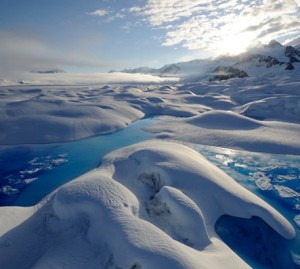Stroud Water Research Center program to showcase film, filmmaker

Meltwater on the surface of Columbia Glacier in Columbia Bay, Alaska, on June 20, 2008, is used to chronicle climate change in “Chasing Ice.” Photo by James Balog
To capture dramatic images demonstrative of climate change, environmental photographer James Balog headed to the Arctic. In “Chasing Ice,” his team documents some of Earth’s most exquisite icy landscapes rapidly melting away – a world-changing experience that will be available to area residents courtesy of the Stroud Water Research Center.
From 4 to 7 p.m. on Sunday, the center will present the film, which uses time-lapse cameras that compress years into seconds, as well as guest speaker Jeff Orlowski, the film’s director and producer, Stroud news release said.
Orlowski worked as a videographer with Balog, a National Geographic photographer, on the initial expedition of the Extreme Ice Survey (EIS). That winter, the EIS team scouted and filmed glaciers that now appear in the documentary feature film “Chasing Ice.”
A New York native, Orlowski has been filming the EIS project around the world, working in some of the most extreme conditions imaginable on locations in Iceland, Greenland, Bolivia, the Alps, Alaska, and Glacier National Park, Montana. Previous work has taken him to the Tour de France and has led him to film a number of notable people including Robin Williams, Jane Goodall, and Nelson Mandela, the release said.
The program will be held at the Copeland Lecture Hall, Winterthur Museum, 5105 Kennett Pike, Wilmington, De. Tickets are $15 for limited seated. To learn more, go to: http://www.stroudcenter.org/Events/#ChasingIce.
Stroud Water Research Center seeks to advance knowledge and stewardship of fresh water through research, education, and global outreach and to help businesses, landowners, policymakers, and individuals make informed decisions that affect water quality and availability around the world. Stroud Water Research Center is an independent, 501(c)(3) not-for-profit organization. For more information, visit www.stroudcenter.org.




